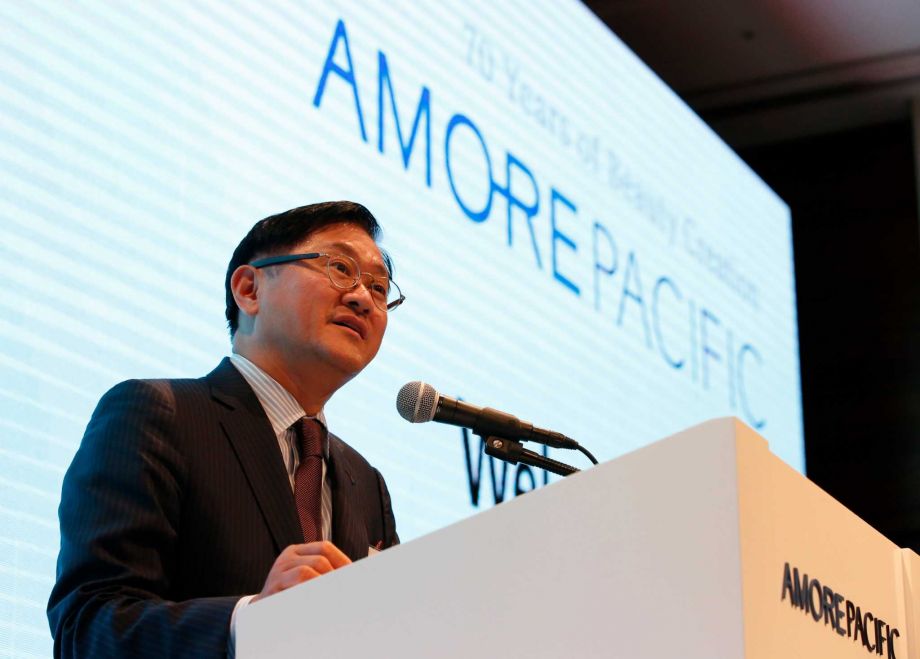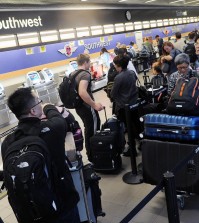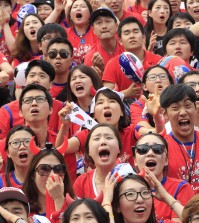- California Assembly OKs highest minimum wage in nation
- S. Korea unveils first graphic cigarette warnings
- US joins with South Korea, Japan in bid to deter North Korea
- LPGA golfer Chun In-gee finally back in action
- S. Korea won’t be top seed in final World Cup qualification round
- US men’s soccer misses 2nd straight Olympics
- US back on track in qualifying with 4-0 win over Guatemala
- High-intensity workout injuries spawn cottage industry
- CDC expands range of Zika mosquitoes into parts of Northeast
- Who knew? ‘The Walking Dead’ is helping families connect
Self-effacing S. Korean billionaire behind rising Asian beauty brand

In this Sept. 9, 2015 photo, Suh Kyung-bae, chairman and CEO of AmorePacific speaks to the media during the company’s 70th anniversary media conference in Seoul, South Korea. South Korea is known around the world for Samsung phones, kimchi and Hyundai cars but ask that question in Asia and the answer might be equally be “air cushion” compacts or sleeping masks. (AP Photo/Lee Jin-man)
SEOUL, South Korea (AP) — South Korea is known around the world for Samsung phones, kimchi and Hyundai cars, but ask that question in Asia and the answer might equally be “air cushion” compacts.
One of the country’s most valuable companies and richest individuals, both little known in the West, owe their financial success to a range of beauty products that have developed an almost cult-like following among the young in East Asia.
AmorePacific, which began decades ago selling camellia hair oil made in a traditional Korean kitchen, has in recent years ridden a wave of enthusiasm for all things Korean created by the popularity of K-pop music and TV melodrama. But it also succeeded by bringing convenience to that which is typically time-consuming and difficult to learn: the beauty regime.
Forbes ranked AmorePacific 28th on its listicle of the world’s 100 most innovative companies this year, a league table to which Samsung or other well-known South Korean conglomerates didn’t make the cut. Profit surged 46 percent during the first half of this year to 564.3 billion won ($472 million) on sales of 2.9 trillion won ($2.4 billion).
Its share price has skyrocketed nearly 4-fold since the beginning of 2014, making AmorePacific’s chief executive Suh Kyung-bae Korea’s second wealthiest individual behind Samsung chairman Lee Kun-hee. South Korea is the company’s mainstay market but sales have taken off elsewhere in Asia, particularly in China.
Despite the sudden rise, Suh, the self-effacing son of the company’s founder, said he believes in “slow learning.”
“There are two types of innovation. One is fast following the great products in the world. The other is the process of slow learning through tests and runs. The second type of innovation is important,” Suh said at a press conference earlier this month. “Innovation can’t be accomplished through one or two super stars.”
He cited the company’s popular air cushion compacts, which changed Asian women’s skincare and makeup routines. About 50 million of the cushions have been sold since their introduction in 2008.
Before the air cushion compacts, liquid makeup foundation came mostly in a bottle or stick and applying the right amount to the skin for a sheer look was tricky, let alone retouching or adding another layer such as sunscreen.
Inspired by Korean parking stamp ink that was lasting and consistent, AmorePacific’s patented cushion is a type of sponge saturated with sunscreen, foundation and various ingredients for anti-aging and moisturizing. Using a puff to apply the concoction from the sponge onto the skin quickly achieves the sought-after dewy look that usually requires considerable practice or training.
It is gradually finding its way into the West as well. After AmorePacific created the cushion category, others followed suit including Lancome, which launched its own cushion foundation this year. In June, AmorePacific signed a partnership agreement on the cushion technology with Parfums Christian Dior.
Suh, 52, who took over running the company from his father 18 years ago, stands out in South Korea’s aloof and nepotistic business culture for humility and openness.
His father, Suh Sung-whan, was a merchant in Kaesong city, then famous for Korea’s most business-savvy merchants but which became part of communist North Korea after the Korean War.
Suh said that during his 20s his father gave him difficult jobs at the company, such as assigning him to the worst-performing sales team and making him responsible for chasing payments from customers that were habitually late with paying their bills.
He said that taught him that every job is important and the value of humility in dealings with others. But he believes the biggest lesson he has learned from years of doing business in Asia is that “we don’t know anything.”
“Because we don’t know, we need to do research. Because we don’t know, we should be curious. Because we don’t know, we should respect local people,” he said.
AmorePacific’s beauty philosophy is to emphasize the important of difference, seemingly at odds with South Korean society’s obsession with cookie-cutter Barbie doll eyes and noses achieved through plastic surgery.
But that message is likely to be essential as the company prepares to bring Asian beauty products to men and women in the Middle East, South Asia and U.S.
The company aims to first target cities with over 10 million people. In China, it seeks to cater to growing numbers of online shoppers.
“The big picture in our strategy is to blend the different beauty of Asia into our brands,” Suh said.
















